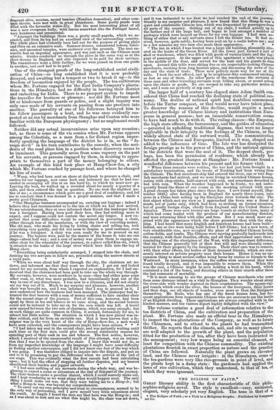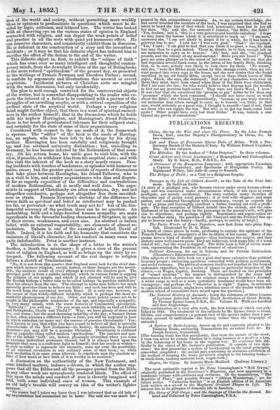THE ECLIPSE OF FAITH. *
Gazer literary ability is the first characteristic of this philo- sophico-religions novel. The style is excellent—easy, animated, elegant, very scholarly yet very English. The tone is that of a
• The Eclipse of Faith ; or a visit to a Religious Sceptic. Published by Longman ad Co.
inan of the world and society, without permitting mere worldly ideas or opinions to predominate in questions which must be de- cided by logic, criticism, and lettered lore. The writer has looked with an observing eye on the various states of opinion in England connected with religion, and can depict the weak points of belief and practice in all the sects with quiet yet humorous effect. He can conceive characters, and consistently exhibit them in discourse. He is deficient in the construction of a story and the invention of incidents ; or it may be that his didactic object has induced him to sacrifice the effect of the fiction to the end of the writer.
This didactic object is, first, to exhibit the " eclipse of faith" which has come over so many intelligent and thoughtful contem- porary minds, from the downright Deism of the age of Bolingbroke to the more refined " spiritualism " of the present day, as presented in the writings of Francis Newman and Theodore Parker; second, to confute by arguments and illustrations this avowed or covert scepticism. Incidental pictures of Christian sects are mingled widi the main discussion, but only incidentally. The plan is well enough contrived for the controversial objects of the writer, but is somewhat disappointing to the reader who ex- pects the interest of a fiction to be combined with a picture of the struggles of an unwilling sceptic, or with a critical exposition of the pretent state of the sceptical world. Perhaps a very religious mind might further object, that there is a want of spiritual earnest- ness in the author himself; that in the discussions which he holds with his nephew Harrington, and Harrington's friend Fellowes, there is too much of goodnatured tolerance for their eclipsed state, and certainly for the state of some of their acquaintances.
Considered with respect to the use made of it, the framework is operose. The " editor " of the book is the uncle of Harring- ton, an orphan, who has been left to his charge by his dying mother. Harrington has been carefully and religiously brought up, and has attained university distinction ; but, travelling in Germany, he has become infected by the Rationalism of that coun- try.. On his return home, his uncle goes to visit him, with the view, if possible, to withdraw him from his sceptical state ; and with this visit the interest of the book as a story nearly ceases. Pass- ing incidents with touches of tenderness, or episodes with humour or satire occur; but the greater part consists of reports of discussions that take place between Harrington, his friend Fellowes, who is on a visit to him, and sundry acquaintances who dine and dispute. So far as regards exposition of the difficulties and contradictions of modern Rationalism all is neatly and well done. The argu- ments in support of Christianity are often cumbrous, dry, and not altogether conclusive perhaps not altogether free from onesided- ness or strain. Francis Newman's doctrine of the difference be- tween faith as spiritual and belief as intellectual may be pushed too far, or perverted—as what truth may not be? but of the fun- damental accuracy of the position there can be no question. An undoubting faith and a large-hearted human sympathy are main ingredients in the favourite leading characters of Scripture, in spite of their errors, weaknesses, and even sins. An abstract or barren belief, with an external' respectability, are elements of almost re- probation. Balaam is one of the examples of belief, David of faith. Indeed, it is his faith and his humanity that constitute the eminence of David's character, for his conduct in many cases was quite indefensible. Peter is another instance.
The introduction is in the shape of a letter to the writer's brother, a South Sea missionary ; it gives a view of the present state of religion in England, as well as brings up the story by re- trospect. The following account of the real clanger to religion follows a sketch of Tractarianism.
"No, it is not from this quarter that England must look for the chief dan- gers which menace religion, except, indeed, as these dangers are the inevit- able, the uniform result of every attempt le revive the obsolete past. The principal peril is from a subtile unbelief, which in various forms is sapping i
the religion of our people, and which f not checked will by and by give the Romiah bishops a better title to be called bishops 'in partibus infidelium' than has always been the case. The attempt to make men believe too much naturally provokes them to believe too little ; and such has been and will be the recoil from the movement towards Rome. It is only one, however, of the causes of that widely-diffused infidelity which is perhaps the most re- markable phaonomenon of our day. Other and more potent causes are to be sought in the philosophic tendencies of the age, and especially a sympathy, in very many minds, with the worst features of Continental speculation. 'Infidelity !' you will say. `Do you mean such infidelity as that of Collins and Bolingbroke, Chubb and Tindal ?' Why, we have plenty of those sorts too, and worse ; but the most charming infidelity of the day, a bastard Deism in fact, often assumes a different form—a form, you will be surprised to hear it, which embodies (as many say) the essence of genuine Christianity! Yes ; be it known to you, that when you have ceased to believe all that is specially characteristic of the New Testament—its history, its miracles, its peculiar doctrines—you may still be a genuine Christian. Christianity is sublimed into an exquisite thing called modern 'spiritualism.' The amount anti qua- lity of the infidel 'faith' are, indeed, pleasingly diversified when you come to examine individual professors thereof, but it is always based upon the Principle that man is a sufficient light to himself; that his oracle is within— so clear as either to supersede the necessity, some say even the possibility, of all external revelation in any ordinary sense of that term; or, when such revelation is in some sense allowed, to constitute man the absolute ar- biter of how much or how little of it is worthy to be received."
A discussion on the authenticity of the New Testament, and some kindred matters, induces a dream, in which the author sup- poses that all the Bibles and all the passages quoted from the Bible in any other work are miraculously rendered blank. The effect of this upon the minds and conduct of men is cleverly imagined and told, with some individual cases of women. This example of an old lady's trouble will convey an idea of the writer's lighter manner.
"No sooner had I taken my leave than I was informed that an old lady of E13 acquaintance had summoned me in haste. She said she was much
am- pressed by this extraordinary calamity. As, to my certain knowledge, she had never troubled the contents of the book, I was surprised that she had so taken to heart the loss of that which had, practically, been lost to her all her days. Sir,' said she, the moment I _entered, 'the Bible, the Bible!' 'Yes, madam,' said this is a very grievous and terrible visitation. I hope we may learn the lessons which it is calculated to teach us.' 'I am sure,' answered she, I am not likely to forget it for a while, for it has been a grievous loss to me.' I told her I was very glad.' 'Glad!' !' she rejoined.
'Yes,' I said; am !Fled to find that you think it so great a loss, for that loss may then be a gain indeed. There is, thanks be to God, enough left in our memories to carry us to heaven.' 'Ah! but,' said she, the hundred pounds, and the villany of my maid-servant ! Have you not heard ? ' This gave me some glimpse as to the secret of her sorrow. She told me that she had deposited several bank-notes in the leaves of her family Bible, thinking that, to be sure, nobody was likely to look there for them. No sooner,' said she, were the Bibles made useless by this strange event, than my ser- vant peeped into every copy in the house, and she now denies that she found anything in my old family Bible, except two or three blank leaves of than paper, which, she says, she destroyed; that if any characters were ever on them they must have been erased when those of the Bible were obliterated. But I am sure she lies; for who would believe that Heaven took the trouble to blot out my precious bank-notes ? They were not God's Word, I trow.' It was clear that she considered the 'promise to pay' better by far than any promises' which the book contained. I should not have cared so much about the Bible,'-she whined, hypocritically, 'because, as you truly observe, our memories may retain enough to carry us to heaven '—a little, in that case, would certainly go a great way, I thought to myself—' and if not, there are those who can supply the loss. But who is to get my bank-notes back again ? Other people have only lost their Bibles.' It was, indeed, a case beyond my power of consolation."



























 Previous page
Previous page